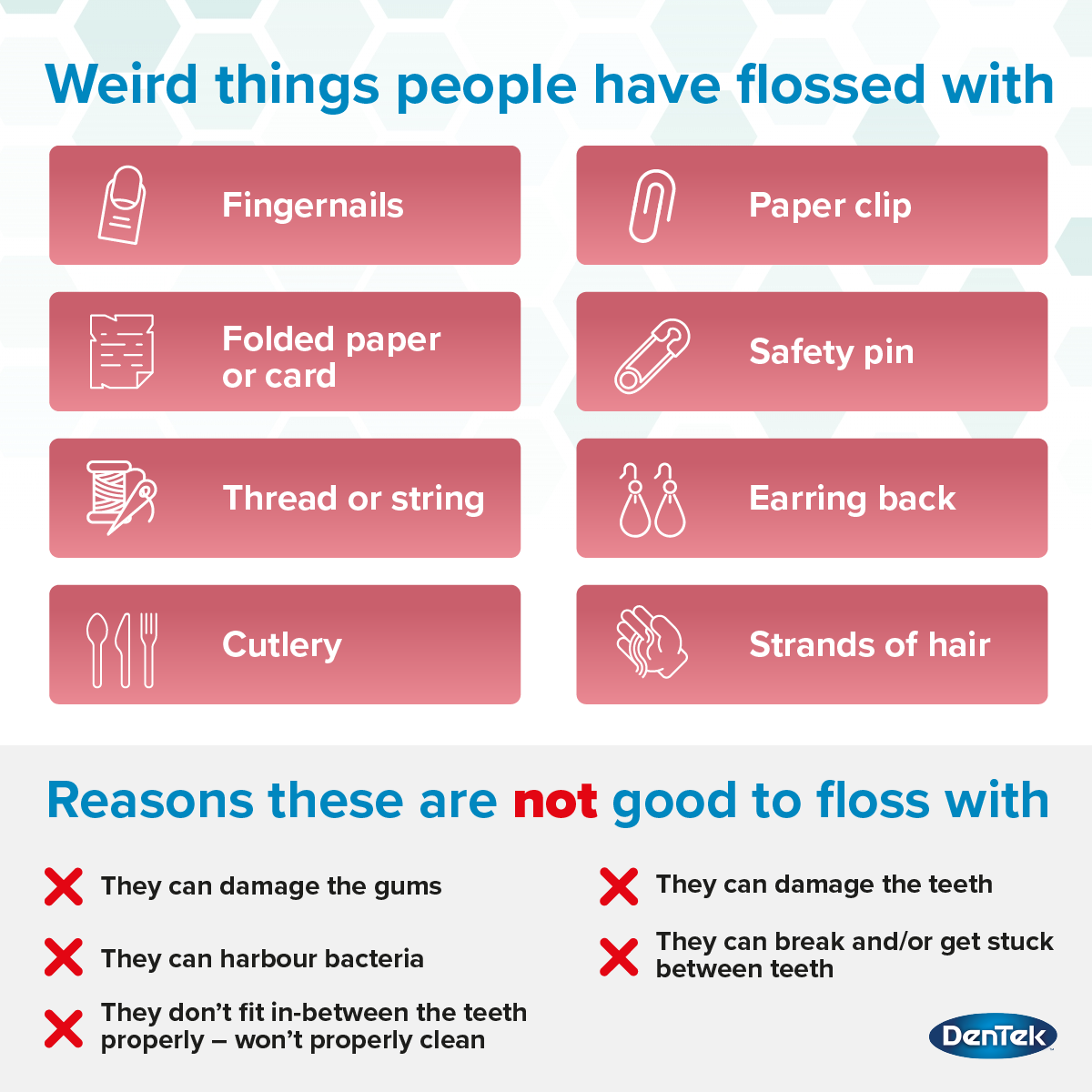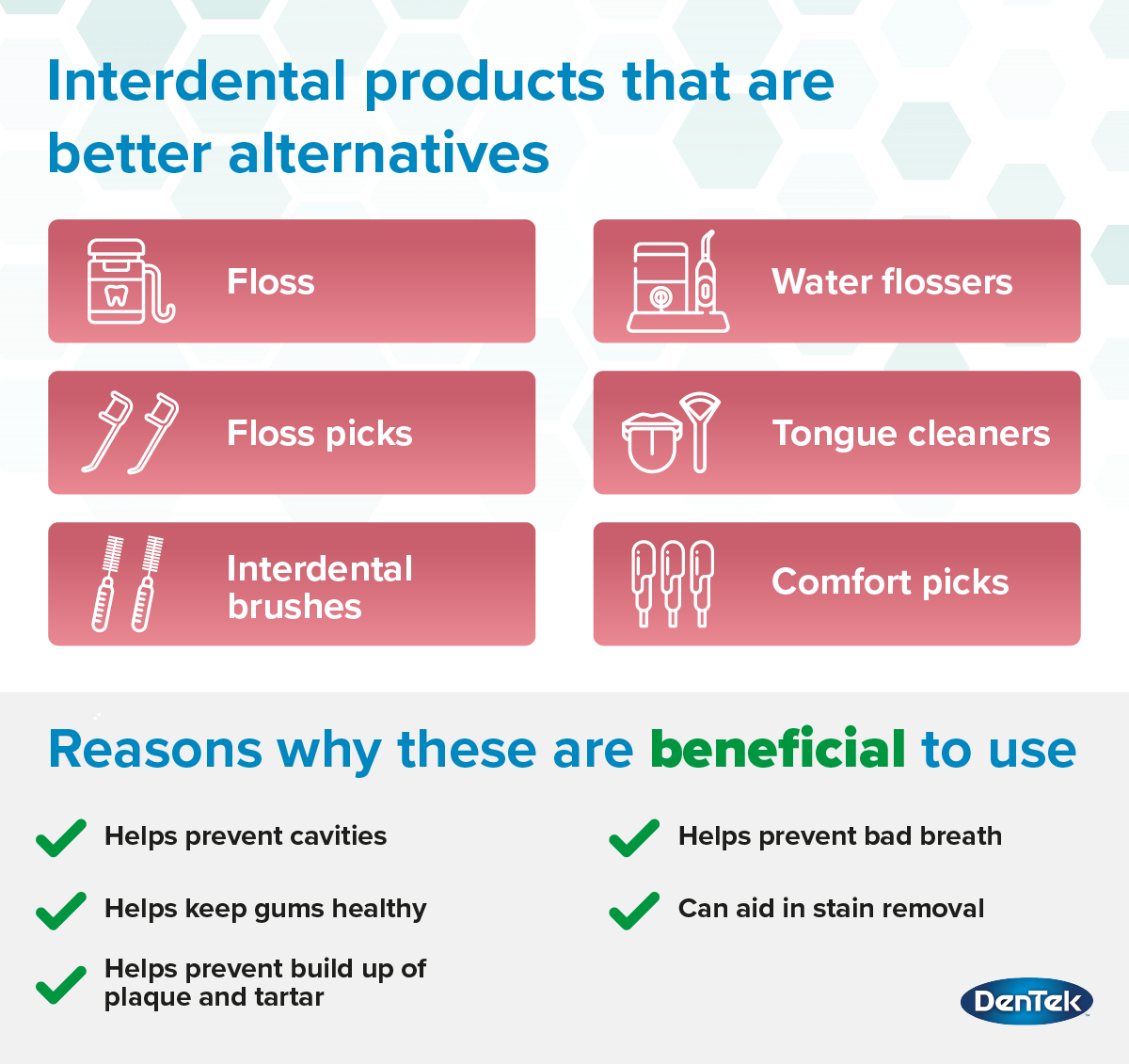Weird Things People Floss With
Using the findings from a survey conducted by Ipsos on behalf of the American Dental Association and Waterpik, we have compiled a list of the most popular things people have used to floss with that do not fall under the standard umbrella of interdental products. You may feel grossed out by the thought of flossing with some of these items, or you might be able to relate! We will discuss why, although it might sometimes seem convenient, using anything but regulated interdental products for flossing is a bad idea.
The following list is based on the top-rated items people have used to floss with according to a recent survey:
- Fingernails: Fingernails can harbour a lot of bacteria which can be harmful to your health.
- Folded paper or card: Paper or card can have sharp edges which, when manoeuvred between the teeth, have the potential to cause cuts on the gum line and tongue.
- Thread or string: Thread or string can leave residue behind or even break apart in the mouth.
- Cutlery: Using hard metal to floss with has the potential to chip teeth and damage gums, especially when using knives with sharp edges.
- Paper clip: Paper clips may get stuck between the teeth or damage the gum line.
- Safety pin: Pins could get stuck between the teeth, as well as having the potential to injure the gums.
- Earring back: Earrings can harbour a lot of bacteria and can pose a choking hazard.
- Strands of hair: Hair can harbour bacteria and has the potential to break off in the mouth or cause cuts to the gum line.
Why are these items dangerous?
Using any item not solely intended for flossing can be detrimental to teeth and gum health. Interdental products are specifically designed with oral health in mind, from ease of use to the materials they are made from. Not only are the items mentioned above ineffective for removing plaque and food debris, but flossing with them can increase your risk of damage to the teeth or gums. These items may become lodged between teeth, leading to cuts or chips. Additionally, there’s a risk of cross-contamination from bacteria on the items entering the mouth, potentially making you ill or causing infection.
You might be tempted to grab the nearest item to you when you’re out and about in public to remove that lingering piece of food from lunch, however many interdental products are designed to be portable and easy to use on the go. Floss picks are small enough to fit in a pocket or bag and can be used for both removing food debris and flossing. There are even cases available to keep your floss pick clean! And if interdental brushes are your preference, retractable, dual-ended brushes are also widely available.

The Importance of Flossing
With only 32% of adults in the UK flossing every day, it’s important to discuss the oral health benefits. Cleaning with a toothbrush alone only reaches 3 of the 5 surfaces of a tooth, the supragingival area of the tooth, the surface area above the gumline. In contrast, flossing reaches the interdental areas, the surface area between the teeth. Studies have shown that floss, interdental brushes or wooden picks, in addition to toothbrushing, may, in the short term, reduce the risk of gingivitis, which is the early stage of gum disease.
Interdental products
Floss
There are many variations of dental floss, and the one you choose to use is completely up to you. Waxed dental floss is simply string floss coated in wax, which you might find easier to manoeuvre between the teeth than unwaxed alternatives. Dental tape typically has a wider and flatter surface area than regular floss and is often made from a silk or satin material to help reduce friction. This may also be a good option if you struggle to hold regular floss. Floss flavoured with peppermint or lemon is common, but unflavoured types are also readily available.
Floss picks
Floss picks are a combination of floss and a dental pick, meaning both ends of the pick can be used for interdental cleaning. The dental pick is good for removing food debris caught between the teeth, especially after eating. On the other end, a small piece of floss is pulled taut, eliminating the need to wrap the floss around your fingers and making it easier to access the wisdom teeth nearer the back of the mouth. Floss picks come in a range of options, including textured picks and crossed floss for covering more surface area and larger teeth gaps.
Interdental brushes
Interdental brushes are designed to clean between teeth, with their small, flexible shape and bristles making them ideal for reaching around braces, crowns, caps and bridges. The brushes typically come in a variety of sizes and are made from bendable wire to enable the brush to manoeuvre tricky gaps. The brushes can also vary, with some bristles being made from soft silicone and others with nylon.
Comfort Picks
Comfort picks are easy to hold, interspace brushes made of soft, flexible, rubber bristles that help to remove plaque and food debris from between the teeth. Because they contain no metal they are gentle on the teeth and gums and wont scratch or damage implants, braces or crowns.
Water flossers
Handheld water flossers, also known as oral irrigators, direct a powerful jet of water between the teeth to remove food debris and plaque. They can be plugged into the mains socket, rechargeable, battery-operated, or connected to a sink faucet or showerhead. Water flossers can be a good option if you have sensitive gums, as the pressure settings can normally be adjusted and there’s less technique involved in using them compared to regular floss.

Remember the potential risks associated with using non-recommended items to floss. Your teeth and gums will thank you for investing in oral care products specifically designed for this purpose.




